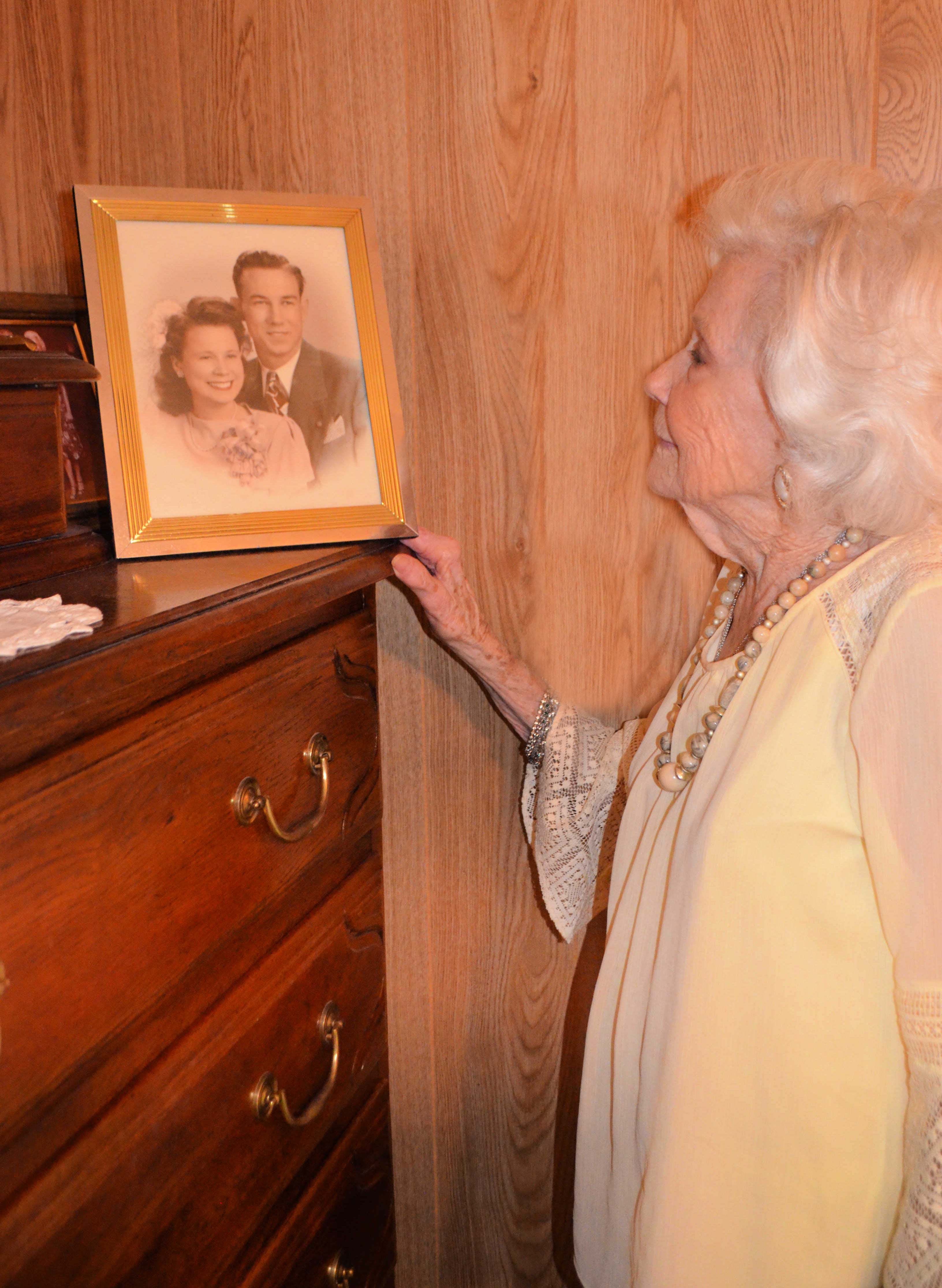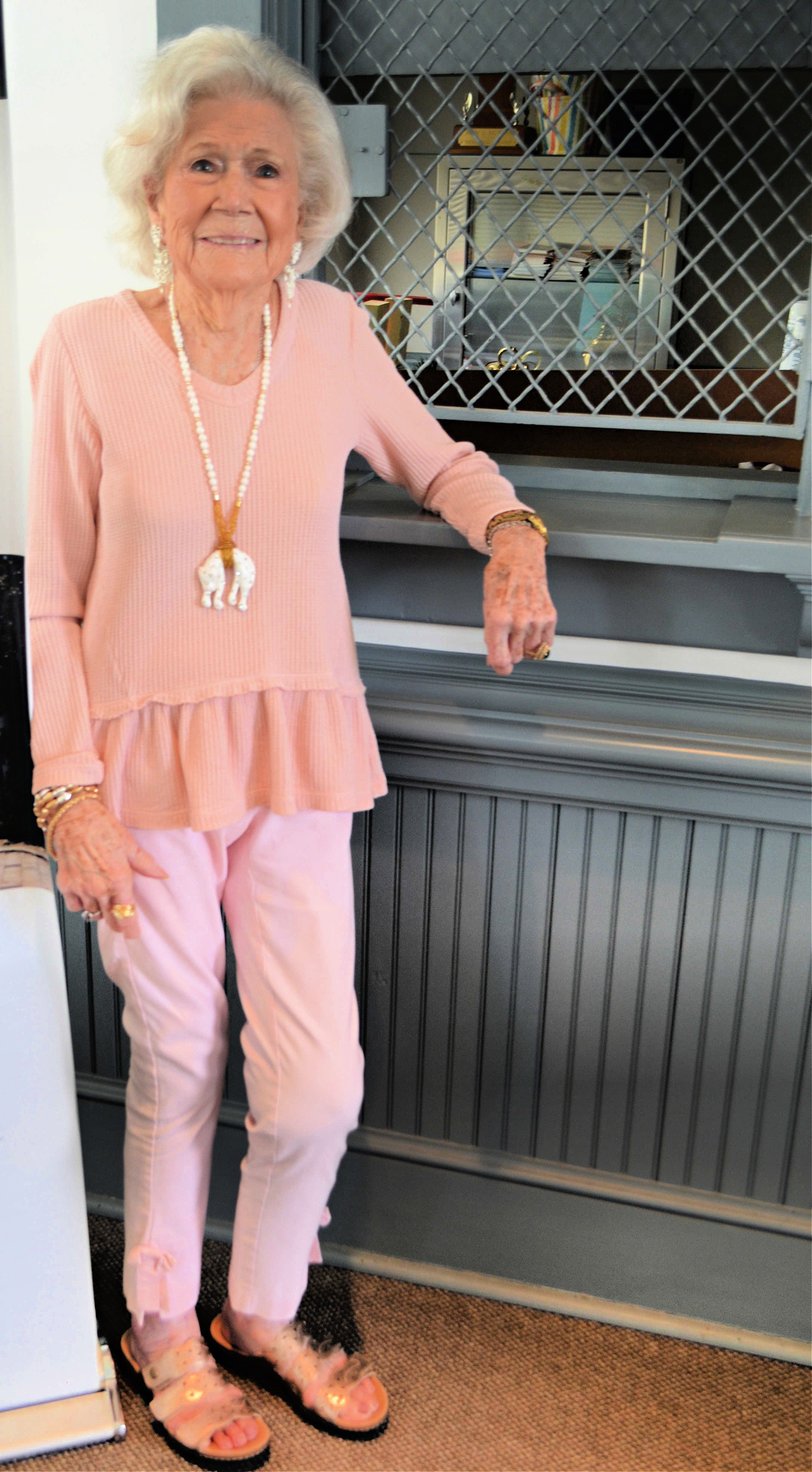99 years of memories
Published 9:58 am Thursday, October 21, 2021
|
Getting your Trinity Audio player ready...
|
By Haley Mitchell Godwin
Eloise Andress Kuczmarksi has lived life to the fullest in her 99 years on earth and has seen many prominent changes from technology to culture.
On September 20, 2021, I sat down with Kuczmarski to reminisce and discuss days gone by. The meeting was facilitated by Barbara Perdue Middleton, President of The Butler County Historical & Genealogical Society. Kuczmarski’s cousin, Sharon Aker Sellers, also joined in on the wonderful conversation.
Kuczmarski has many precious memories. She said her life has been lived with no regrets. She harped on the fact that her life has been very blessed. Kuczmarski said she would not change a thing.
on the fact that her life has been very blessed. Kuczmarski said she would not change a thing.
She was born Sept. 9, 1922, only 3 years after the Spanish Flu Pandemic came to an end. Although none of Kuczmarski’s family succumbed to the Spanish Flu, she recalls talk of how devastating the pandemic was. Kuczmarski said that so many people died from sickness back then, and now, having lost loved ones to COVID, she has an uneasiness about this pandemic, despite the amazing medical advancements.
Although the current state of the world causes her some anxiety, being able to still take care of herself and all her affairs on her own, helps maintain peace and harmony in her life. Kuczmarski often wonders why she is still around, but she does not question God’s plan. She is certain she is still on the earth for a reason, a reason she may not realize, but one that her cousin Sharon fully comprehends.
“She gives so much to her community and her family and friends. She is a joy to be around and her personality is ageless. She has enlightened a lot of people and continues to be a blessing to all that know her,” Sellers said.
Upon her entry into this world, Kuczmarski and her family lived in the Daisy Community in Butler County, very near Daisy School. She was the second of nine children in a family that consisted of three girls and six boys. Four of the nine are still living. Mrs. Kuczmarski was named after her mother’s college roommate that passed away the year of graduation. It was when she was getting her passport for a trip to England, she realized how her Popa had written her name while recording the birth statistics being called out by her father. The name was phonetically spelled- Ellawees. This discovery has made for a comical story. However, Kuczmarski did have the spelling corrected.
The first memory she can recall takes her back to when she was about five years old. Her mother was trying to get her dressed and Kuczmarski spoke up, professing that she was big enough to dress herself, and she did, missing a button or two.
When she was nine, she remembers moving from the Daisy Community to the area where she spent the balance of her childhood.
“The bridge at Pigeon Creek was being rebuilt and we had to take a detour. I remember it like it was yesterday. The move wasn’t very far away, but it seemed like it took forever. We moved in a mule and wagon,” Kuczmarski said.
Kuczmarski attended the Daisy School for one year. Then she went to Mt. Zion until it burned down. After that, she had to go to Greenville for school.
When Mrs. Kuczmarski was a child, she said she loved playing in her playhouse under the arbor.
“I had to play by myself until my sister Betty came along when I was ten. I was the only girl until she was born, but with nine kids, I had to help mother quite a bit and there wasn’t a whole lot of time to play. I toted my brother Harold on my hip so often that I wondered why I wasn’t sideways,” Kuczmarski joked.
The Great Depression did not hit her family as hard as it did some. Her father was in the military during WWI and drew a pension throughout the depression and although it was hard, Kuczmarski said it could have been much worse.
“With so many kids I think it was a little harder to get by, but we had Daddy’s pension. It of course only went so far, but we had cows, chickens and our garden to provide food. We did pretty good, even though we were still poor like a lot of people in the area were during that time,” she said.
Kuczmarski’s grandparents lived in Montgomery and every July she would take the train to Greenville to spend a couple of weeks with them.
“It was such a pleasant experience. I remember going up to the ticket window. It looks the same now as it did then. I was 10 the first time I went and I always went by myself. The conductor was always so nice and kind of watched after me,” Kucamarski said.
“I always wanted to go on a long train trip, with overnight sleeping in a sleeping compartment. It is so special to go on a trip like that. I was never able to do that. Montgomery is as far as I got on the train.”
It was on these trips to Montgomery that she took later as a teenager and young adult, when she first met who would come to be her husband and the love of her life.
“It seemed like every time I would go to Montgomery I would run into him. Then later on I moved to Montgomery with my cousin and ran into him while I was out paying the gas bill. Leonard saw me, but could not remember my name. He was having a conversation with another gentleman, but quickly ended it to ask me my name,” Kuczmarski said.
They began courting but Leonard soon found himself serving his country as a proud member of the U.S. Air Force and spent 43 months overseas. When his service ended, he and Eloise married. May 29, 1946 was when their wedded bliss began, thanks in part to the railroad running through Greenville.
Mrs. Kuczmarski’s cousin, Sharon Aker Sellers, rode the train from her home in New Jersey to Greenville a couple times a year to visit her grandparents.
“In the 50s there were hostesses with white gloves serving food and drinks. Once they served a roasted turkey dinner and it was so delicious. My sister and I slept on the train in our little compartments with the fold out beds and a toilet. It was really neat,” Sellers said.
Mrs. Barbara Perdue Middleton shared a little insight about the Greenville railroad.
“Roads were not paved in this area until about 1944. A big rain often meant no trips to town or anywhere else, so people would often get on the train in Greenville and go to Montgomery and maybe spend the day, do their shopping, and come back. Some might stay overnight. The Geneva Flyer took people south. The Hummingbird is another train name some might find familiar,” Middleton said.
“The first settlers here came in the early 1800s from Georgia and the Carolinas. They came via the Federal Road, which was a major pioneer highway that opened up the southern section of Ala. to settlement. As time went by, the ability for Greenville’s economy to grow was inhibited by its inability to transport goods to other towns. When the rail line through Greenville was completed in 1855, the city’s prosperity began to grow quickly.”
Kuczmarski said WWII was a struggle for her and every American. Things being rationed was, at times, hard to deal with. They just did what they had to do and adjusted accordingly, she said. During WWII, Kuczmarski worked at Montgomery Fair and lived with her sister in Montgomery. Employees at Montgomery Fair were told to keep the curtains pulled and all the windows covered so that the enemy could not see in. Kuczmarski was much less concerned with the enemy than those in charge of the store were.
She was not extremely worried about those back at home. Steiner’s store had a syrup mill and a grist mill. Her family was still farming. They ground their own meal and Kuczmarski said they had a lot of ways to help them get by. Her mother was also very handy and creative when it came to ways of conserving, she said.
Kuczmarski said she could not have had a better mother. With nine kids, she never yelled but focused more on teaching them all the best things in life. Her mother died at only 59 and Kuczmarski said it was a huge blow to her and the rest of the family. She is thankful that her father, who Kuczmarski said was a great farmer and a great provider, lived until 85 years of age. After his death, Kucsmarski and her husband Leonard moved into the home where her father was residing.
The job with Sears that Kucmarski’s husband held for 43 years began in Montgomery, took them to Mobile and then to Atlanta. After Kuczmarski’s children were grown, she went back to work, this time at Richie’s Department Store in Atlanta (now Macy’s). She loved working there at the Estee Lauder counter and her career there lasted 24 years. She was always in the fashion shows held by the department store. She aspired to one day be a designer but is content with the enjoyment she got from making her own stylish clothing. She would often see new fashions at the department store or in Vogue magazine, and then go home and recreate the outfits for herself on her own sewing machine.
Kuczmarski said that so many things have changed during her lifetime and spoke of life changing inventions and cultural changes as well.
“I remember when we first got electricity in our home. It was a Wednesday. I could not wait to get home from school so I could pull that string and turn the little drop light on. It was so much better than a lamp. I could study and read at night after we got electricity. I thought it was the greatest thing I had ever seen,” Kuczmarski said.
“I think we were the first ones in the area to get a radio. On Saturday nights folks would come and listen to The Grand Ole Opry with us. My uncle had the first TV I ever saw. We would go over to his house and line chairs up. Folks from all over the community would come to watch. Now kids can watch TV on their phones and send pictures and do all kinds of things that are sometimes hard for me to comprehend. I have adjusted though and I do a little on my iPad, but if my parents and grandparents could see what we have now, they just would not believe it.”
Kuczmarski did not learn to drive until after she was married. Her mother never drove, and although she had a college education, never worked outside the home. Kuczmarski said that at one time all women thought that the only place they needed to be was in the home taking care of their husband, kids, and the house. She is very proud of the exceptional job her mother did with the difficult and most imperative job of raising her and her siblings. Kuczmarski does think that things have changed for the better, however.
“Women were once not as important as they are today. Being a mother is the hardest and most important job, but women now do more of their own thing and I think that is good. Every generation is different. I didn’t go to work until after my kids were grown, but the job I wanted to do best was raising my children. I wanted them to do the right thing, make good choices, and become good adults. Both my sons learned to cook and they both went to work in education,” Kuczmarski said.
Her grandmother Lester also had a college degree from Highland Home College, which primarily trained teachers. There are many educators in the family and according to Kuczmarski, at one time there were 25 teachers among her close relatives. Her late son Jim was an educational consultant for the state of Connecticut and her son Michael was the principal of a high school. She is very proud that their careers made a difference.
Family has always been important to Kuczmarski and she said that as she has gotten older, family has become an even more paramount element of life.
“When I was a child and visiting my grandparents in Montgomery, we would have family reunions at Oak Park every year. Aunts, uncles, cousins, all kinds of family would come. I’ve tried to carry on that tradition and keep the family together. That is really important to me.”
“I have hosted many reunions here. The last one was in November of 2014. Leonard died in 2015 and seven months later I lost my oldest son. That was the hardest time of my life and I just haven’t had one since. I really want to have another one. Leonard built a barbecue pit here just for the reunions. We always had the reunion the Sunday after Father’s Day. I don’t want to lose any connections and I want newer and future generations to stay close. I hope the tradition of family reunions can be carried on after Covid goes away.”
Kuczmarski said if she had any advice for younger generations, it would be to never do anything in excess, whatever it is. To take care of yourself so you can better help take care of others.
At 99, the only health problems she has is high blood pressure, which she has had since she was 43, and a small thyroid issue.
“I guess I would say that I owe my long and healthy life to never smoking or drinking or ever being overweight. I’ve always eaten healthy and exercised. Working in my flower beds kept me active. I used to walk four miles a day. Then three. Then two but not very long ago I had to stop walking,” Kuczmarski said.
Kuczmarski has two grandchildren and five great- grandchildren. One of her great grandsons is in college at the University of Georgia and another will graduate high school this year with a golf scholarship. She is so proud of all her grands. Kuczmarski said with her mother having so many grandchildren, she could not make much of a fuss over them so she is proud to be able to make so much of a fuss over hers. She is really enjoying her grands, and every aspect of her golden years. Kucmarski is looking forward to cooler temps and the time of year when her late husband would say, “It’s time to put the feathers on the bed!”
Kuczmarski enjoys not having to set an alarm, having the freedom to do whatever it is she wants to do and loves going to Sunday school and church. She is the oldest member at Spring Creek Church and loves her church family. She decided when she turned 98 that she would stop driving, so her niece,Kay Bowden, picks her up every Sunday. Kuczmarski is on the hospitality committee at church and plays a big role in the preparation for various events and dinners. She is a longtime member of the Steiner’s Store Home Demonstration Club and is very happy that meetings have begun again after COVID temporarily brought the gatherings to a halt.
“You know my grandmother always said that you learn something new every day of your life, and that is very true. I am still learning every day, and I’ve learned that there have been many more good times and great days than there have been bad. I’ve gone through some bad times, but we’ve all made it. People have been so good to me,” Kucmarski said.
Her cousin Sharon closed the chat. “It is so easy to be good to her when she has always been so unbelievably good to others,” she said.
After being away from her childhood home for more than 60 years, Kuczmarski now resides on the same piece of property she moved to in a covered wagon 90 years ago.






